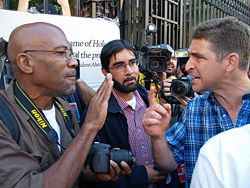
Argumentative dialogue
Encyclopedia

No true Scotsman
No true Scotsman is an informal logical fallacy, an ad hoc attempt to retain an unreasoned assertion. When faced with a counterexample to a universal claim, rather than denying the counterexample or rejecting the original universal claim, this fallacy modifies the subject of the assertion to...
fallacy:
- Argument: "No Scotsman puts sugar on his porridge."
- Reply: "But my friend Angus likes sugar with his porridge."
- Rebuttal: "Ah yes, but no true Scotsman puts sugar on his porridge."
In this dialogue, the proposer first offers a premise, the premise is challenged by the interlocutor, and finally the proposer offers a modification of the premise. This exchange could be part of a larger discussion, for example a murder trial, in which the defendant is a Scotsman, and it had been established earlier that the murderer was eating sugared porridge when he or she committed the murder.
In argumentative dialogue, the rules of interaction may be negotiated by the parties to the dialogue, although in many cases the rules are already determined by social mores. In the most symmetrical case, argumentative dialogue can be regarded as a process of discovery more than one of justification of a conclusion. Ideally, the goal of argumentative dialogue is for participants to arrive jointly at a conclusion by mutually accepted inferences. In some cases however, the validity of the conclusion is secondary. For example; emotional outlet, scoring points with an audience, wearing down an opponent or lowering the sale price of an item may instead be the actual goals of the dialogue. Walton distinguishes several types of argumentative dialogue which illustrate these various goals:
- Personal quarrel.
- Forensic debate.
- Persuasion dialogue.
- Bargaining dialogue.
- Action seeking dialogue.
- Educational dialogue.
Van Eemeren and Grootendorst identify various stages of argumentative dialogue. These stages can be regarded as an argument protocol. In a somewhat loose interpretation, the stages are as follows:
- Confrontation: Presentation of the problem, such as a debate question or a political disagreement
- Opening: Agreement on rules, such as for example, how evidence is to be presented, which sources of facts are to be used, how to handle divergent interpretations, determination of closing conditions.
- Argumentation: Application of logical principles according to the agreed-upon rules
- Closing: This occurs when the termination conditions are met. Among these could be for example, a time limitation or the determination of an arbiter.
Van Eemeren and Grootendorst provide a detailed list of rules that must be applied at each stage of the protocol. Moreover, in the account of argumentation given by these authors, there are specified roles of protagonist and antagonist in the protocol which are determined by the conditions which set up the need for argument.
Many cases of argument are highly unsymmetrical, although in some sense they are dialogues. A particularly important case of this is political argument
Political argument
A political argument is an instance of a logical argument applied to politics. Political arguments are used by academics, media pundits, candidates for political office and government officials. Political arguments are also used by citizens in ordinary interactions to comment about and understand...
.
Much of the recent work on argument theory has considered argumentation as an integral part of language and perhaps the most important function of language (Grice
Paul Grice
Herbert Paul Grice , usually publishing under the name H. P. Grice, H...
, Searle
Searle
-Persons:*Searle *Searles *Searl *Searls -Businesses:*G. D. Searle & Company, a pharmaceutical corporation that also makes food additives**Searle Scholars Program, an award sponsored by the same company...
, Austin
J. L. Austin
John Langshaw Austin was a British philosopher of language, born in Lancaster and educated at Shrewsbury School and Balliol College, Oxford University. Austin is widely associated with the concept of the speech act and the idea that speech is itself a form of action...
, Popper
Popper
Popper may refer to:* Jalapeño popper, a type of food* Poppers, the family of drugs that are a subset of a class of chemicals known as alkyl nitrites* Poppers, a brand of frozen food owned by Heinz...
). This tendency has removed argumentation theory
Argumentation theory
Argumentation theory, or argumentation, is the interdisciplinary study of how humans should, can, and do reach conclusions through logical reasoning, that is, claims based, soundly or not, on premises. It includes the arts and sciences of civil debate, dialogue, conversation, and persuasion...
away from the realm of pure formal logic.
One of the original contributors to this trend is the philosopher Chaim Perelman
Chaim Perelman
Chaïm Perelman was a Polish-born philosopher of law, who studied, taught, and lived most of his life in Brussels. He was among the most important argumentation theorists of the twentieth century...
, who together with Lucie Olbrechts-Tyteca
Lucie Olbrechts-Tyteca
Lucie Olbrechts-Tyteca was a Belgian academic and longtime co-worker of the philosopher Chaïm Perelman. She volunteered in 1948 to support his work and developed several aspects of the New Rhetoric independently in later years....
, introduced the French term La nouvelle rhetorique in 1958 to describe an approach to argument which is not reduced to application of formal rules of inference. Perelman's view of argumentation is much closer to a juridical one, in which rules for presenting evidence and rebuttals play an important role. Though this would apparently invalidate semantic concepts of truth, this approach seems useful in situations in which the possibility of reasoning within some commonly accepted model does not exist or this possibility has broken down because of ideological conflict. Retaining the notion enunciated in the introduction to this article that logic usually refers to the structure of argument, we can regard the logic of rhetoric as a set of protocols for argumentation.

